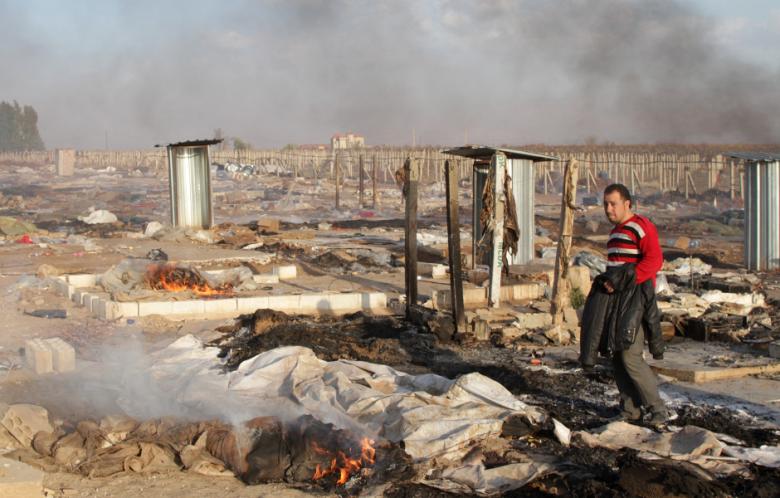 The wood-framed tents on this muddy field in the Bekaa Valley have burned to the ground, leaving only remnants of the lives of the Syrian refugees and migrant workers who occupied them: Shoes. Scattered tomatoes. A pink plastic comb. Metal latrines , provided by the U.N. High Commissioner on Refugees.
The wood-framed tents on this muddy field in the Bekaa Valley have burned to the ground, leaving only remnants of the lives of the Syrian refugees and migrant workers who occupied them: Shoes. Scattered tomatoes. A pink plastic comb. Metal latrines , provided by the U.N. High Commissioner on Refugees.
The tents were torched by local villagers, amid allegations that some residents of the camp had sexually molested a mentally disabled young man. The ousted Syrians say that claim was fabricated at the behest of a new landowner who wanted to evict them from the site.
At least 400 refugees and migrant workers lived in this informal encampment on the outskirts of Qsar Naba, a mostly Shiite village of 8,000 people. They are typical of many of the estimated 800,000 Syrians who have fled to Lebanon since the beginning of Syria’s civil conflict in 2011.
Because of political and sectarian sensitivities, Lebanon did not establish its first official refugee transit camp until last month. That camp has 70 tents. The vast majority of those fleeing the violence have found themselves dependent on private landowners for shelter.
The camp that was burned had been used by Syrian migrant workers for 15 years. Since the start of the civil war, however, workers have stayed all year, instead of leaving when seasonal agricultural work dried up. Friends and family joined them. The UNHCR says the camp had 400 residents in 40 tents, although the residents and the local mayor put the number closer to 1,000.
The government of Lebanon, a country the size of Delaware, struggles to provide its 4 million citizens with basic services such as water and electricity. It has been further overwhelmed by the flow of people fleeing the war. The influx has strained resources, increased competition for jobs and stirred sectarian tensions, as the Syrians — mostly Sunni Muslims — seek refuge in this largely Shiite area.
“This area has been for centuries for the Shia people,” said Nameh Daher, a Lebanese architect who lives about three miles from the camp. “We are open-minded, but we don’t want them bringing the conflict in Syria with them.”

Daher, aided by a friend, Abbas Harbe, ticked off a list of complaints about the Syrians that conformed to local stereotypes. The refugees look at women inappropriately, Daher said. They have poor hygiene, Harbe said, and they steal. Sunni preachers come to visit them. “We see them sitting with a sheikh, with a big beard, and it’s scary for us,” Harbe said.
The tensions appeared to have bubbled over last weekend, when the family that recently bought the land housing the camp accused the Syrian residents of molesting the disabled man.
The landlords gave the entire group 24 hours to leave. But villagers returned before the deadline, residents said, and threw molotov cocktails from the roof of a nearby, half-constructed building. The tents, made of tarpaulins attached to wood frames, quickly ignited.
“We said, if you find someone who is molesting the boy, you are welcome to hang him from the power cable,” said Abu Abdullah, a father of five who said he was too scared for his safety to give his real name.
“My brother used to stay over there, my sister over there,” Abdullah said, looking around the charred ground. “We were just Syrian refugees who ran away from a war. We didn’t want to harm anyone.”
The Syrian Opposition Coalition, the main group representing those trying to oust Syrian President Bashar al-Assad, condemned the forced eviction of the camp as “unethical and inhumane” and called the molestation allegations “completely false.” A local doctor, too, concluded there was no evidence of an assault.
But the doctor’s report was dismissed by Qsar Naba Mayor Daher Hani Dirani. “In this area, we don’t have doctors that specialize in such cases,” Dirani said. “We have doctors who if somebody got shot can tell you what weapon was used.”
The mayor said no one from the village had harmed the refugees. He claimed that the Syrians set fire to the tents during “infighting” and said that residents of Qsar Naba treat the Syrians as “brothers.”
“The Syrians are going to burn their own houses?” countered Abu Ahmed, 35, a Syrian who lives in a neighboring camp. “The Lebanese are the ones burning the houses. If a candle tips over in a place like this, all the people know to run to put it out. They know the consequences.”
Ahmed said residents of his camp had taken in their displaced countrymen for one night but then asked them to leave after being threatened by local villagers.
Ahmed Abdullah, 33, a refugee from the Syrian town of Raqqah who lived in the camp that was burned, said the animosity of local residents “isn’t something that happened overnight. It’s been escalating for months.”
A new car he bought was quickly stolen by armed men from the village, Abdullah said. “I worked with a person before who owed me $1,000,” he added. “And he threw a chair at me from a second-floor window and told me, ‘I owe you nothing.’ ”
Lisa Abou Khaled, a UNHCR representative for the Bekaa region, said accommodations for refugees are increasingly hard to come by, with the few landlords who have vacant buildings or land often unwilling to rent. She said that many Lebanese have opened their homes and property to those fleeing Syria, and added that forced evictions like what happened in Qsar Naba were unusual.
“It’s certainly not unanimous behavior,” Abou Khaled said. “Incidents like this, knock on wood, so far are minimal.”

Leave a Reply
You must be logged in to post a comment.